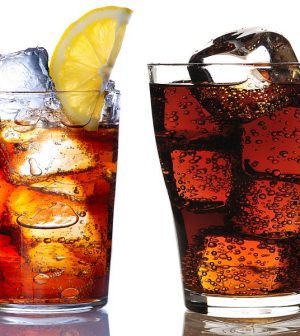- Could Your Grocery Store Meat Be Causing Recurring UTIs?
- Are You Making This Expensive Thermostat Error This Winter?
- Recognizing the Signs of Hypothyroidism
- 10 Strategies to Overcome Insomnia
- Could Artificial Sweeteners Be Aging the Brain Faster?
- Techniques for Soothing Your Nervous System
- Does the Water in Your House Smell Funny? Here’s Why
- Can a Daily Dose of Apple Cider Vinegar Actually Aid Weight Loss?
- 6 Health Beverages That Can Actually Spike Your Blood Sugar
- Treatment Options for Social Anxiety Disorder
Why Diet Sodas Aren’t the Answer for Your Sugary Drink Cravings

The health risks of sugary drinks, from juice to soda, are well known. They can lead to overweight and diabetes, stroke and other problems in the brain, including poorer memory and smaller brain volume.
But diet sodas aren’t the answer. A number of studies have found an association between artificially sweetened beverages and an increased risk of stroke, heart disease, heart attack and other heart-related deaths in women.
The most recent was published earlier this year in the journal Stroke, with researchers suggesting that, even without identifying a specific cause and effect, people should seriously consider the potentially harmful effects of artificially sweetened drinks.
And there’s more. Researchers at the Boston University School of Medicine followed 4,000 people of both sexes over 10 years. Using MRI tests, they linked just one artificially sweetened soda a day to brain changes that can lead to dementia, as well as the type of stroke caused by a blockage in a blood vessel. These risks were triple those of people who don’t drink diet sodas. It didn’t seem to matter which common artificial sweetener — saccharin, aspartame or sucralose — was consumed.
While some people see diet soda as a way of weaning off regular soda, it may be healthier in the long run to skip this type of transition. If you like soda’s carbonation more than the better option of water, flavor plain seltzer with a squeeze of your favorite citrus fruit, a few crushed berries or both. For variety, try freshly grated ginger, chopped mint or a teaspoon of vanilla. Also consider replacing soda with a glass of milk — you’ll get important protein and a shot of calcium in the bargain.
More information
The Center for Science in the Public Interest has more on sugar substitutes and other common additives in beverages and food.
Source: HealthDay
Copyright © 2026 HealthDay. All rights reserved.










